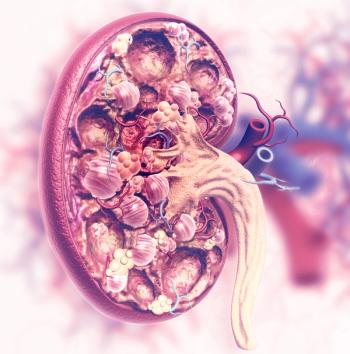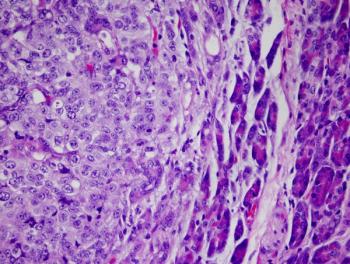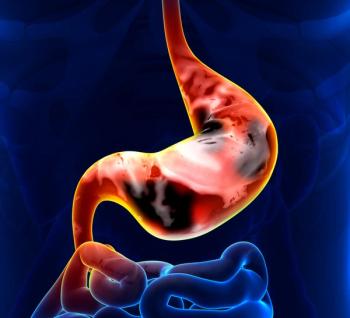
Findings from a retrospective study demonstrate the feasibility of using brexucabtagene autoleucel to treat patients with relapsed/refractory B-cell acute lymphoblastic leukemia with central nervous system involvement.

Your AI-Trained Oncology Knowledge Connection!


Findings from a retrospective study demonstrate the feasibility of using brexucabtagene autoleucel to treat patients with relapsed/refractory B-cell acute lymphoblastic leukemia with central nervous system involvement.

Data from the phase 1/2 LINKER-MM1 trial support the biologics license application for linvoseltamab as a treatment for patients with relapsed/refractory multiple myeloma.

Robert A. Winn, MD, gives insight into how institutions and community practices can improve access to cancer care.

The FDA has set a Prescription Drug User Fee Act date of June 21, 2024 for adagrasib plus cetuximab as a treatment for patients with previously treated KRAS G12C-mutated colorectal cancer.

Results from the phase 3 LAURA trial found a statistically significant PFS benefit and a positive trend in OS with osimertinib following chemoradiotherapy in patients with stage III EGFR-mutated non–small cell lung cancer.

Patients with relapsed/refractory multiple myeloma can now receive teclistamab at 1.5 mg/kg every 2 weeks following the FDA’s latest approval.

Data from the phase 3 NRG-GY018 trial support the supplemental biologics license application for pembrolizumab plus chemotherapy as a treatment for those with primary advanced or recurrent endometrial cancer.

Findings from the phase 3 TROPION-Lung01 trial support the biologics license application for datopotamab deruxtecan as a treatment for those with advanced nonsquamous non–small cell lung cancer.

Practices should not differentiate treatment options based on race for patients with metastatic renal cell carcinoma, according to Jasmeet Kaur, MD.

Findings from the phase 2 UNICORN trial support osimertinib as a potential treatment option for patients with metastatic non–small cell lung cancer harboring uncommon EGFR mutations.

Secondary primary lung cancer rates and cumulative incidence rates were similar in multiple subgroups of patients with stage T1aN0 non–small cell lung cancer.

Imaging after 1 week of treatment with pembrolizumab may help identify treatment responses in patients with metastatic melanoma.

Data from the phase 3 EV-302 trial support the supplemental biologics license application for enfortumab vedotin plus pembrolizumab for patients with advanced or metastatic urothelial cancer in Japan.

As the 41st Annual Miami Breast Cancer Conference approaches, Debu Tripathy, MD, prepares to step down as cochair.

Jun Gong, MD, and Daneng Li, MD, spoke about trials they feel can impact the gastrointestinal space during a CancerNetwork® X Space.

Over half of the patients with HER2-negative gastric or gastroesophageal junction adenocarcinoma achieve a major pathological complete response following treatment with sintilimab plus FLOT in a phase 2 trial.

A patient reported outcome analysis of the phase 3 OlympiA trial found that treatment-emergent symptoms were easily resolved after treatment with olaparib for BRCA1/2 high-risk HER2-negative breast cancer ended.

Measurable residual disease–guided ibrutinib plus venetoclax in chronic lymphocytic leukemia appears to be particularly beneficial in patients with unmutated IGHV and specific genetic abnormalities.

The National Comprehensive Cancer Network has issued a category 2A recommendation for the use of goserelin for ovarian function suppression in those with breast cancer.

Data from the phase 3 FLAURA 2 trial support the FDA approval of osimertinib plus chemotherapy for treating patients with EGFR-mutated non–small cell lung cancer.

Patients with unresectable or metastatic melanoma previously treated with a PD-1 blocking antibody can now receive lifileucel after accelerated approval from the FDA.

Experts in multiple myeloma debated the use of teclistamab through an inpatient or outpatient setting.

A retrospective cohort study from the Trans-Atlantic Pancreatic Surgery Consortium determined a sustained OS rate with modified FOLFIRINIX in patients with pancreatic ductal adenocarcinoma.

Data from the phase 3 RATIONALE-315 study support the use of perioperative tislelizumab plus neoadjuvant chemotherapy in resectable stage II to IIIA non–small cell lung cancer.

Narjust Florez, MD, and Sandip P. Patel, MD, cohosted a X chat centering on treatment options for KRAS G12C non–small cell lung cancer.

Results from the phase 2 VISION trial have allowed for tepotinib to receive full approval by the FDA in non–small cell lung cancer harboring MET exon 14 skipping alterations.

Findings from a study raise concerns for the outcomes of individuals who experience an adverse financial event prior to a cancer diagnosis.


The FDA is expected to issue a Prescription Drug User Fee Act date for denileukin diftitox in cutaneous T-cell lymphoma within 30 days of accepting the biologics license application resubmission.

Investigators report clinical benefit with sacituzumab govitecan plus pembrolizumab across all prespecified patient subgroups with metastatic urothelial cancer in cohort 3 of the phase 2 TROPHY-U-01 trial.